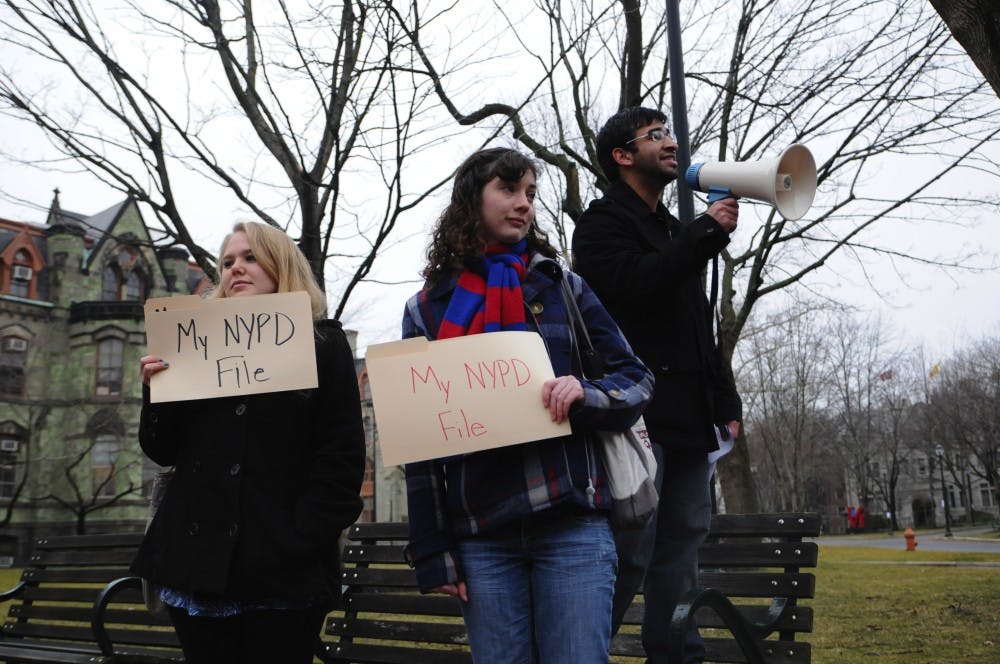A recent protest on College Green by supporters of Penn’s Muslim Students Association has prompted some to reflect upon a similar demonstration that took place almost a year ago.
Last April, more than 200 students and faculty members participated in a silent protest against racism on College Green. The protest was triggered by a Daily Pennsylvanian guest column in which then-College of Liberal and Professional Studies student Christopher Abreu described an encounter with racism on Penn’s campus.
The protest was dubbed “We Belong at Penn.”
For some, the MSA’s recent demonstration against the New York Police Department’s surveillance of Muslim students on college campuses — which was brought to light by an Associated Press report last month — carried a similar message to the We Belong movement.
Abreu said he was pleased to see students take action “because it helps spread the news about racial profiling by NYPD.”
“I hope that it creates a dialogue between the community and police organizations so that there can be a solution instead of just disapproval and anger,” he said.
Although the We Belong movement has been all but phased out across campus, Abreu is pleased that students have worked to sustain a dialogue on race relations.
For his part, Abreu has been working since last April to launch a nonprofit organization called “We Belong.”
Related
NYPD found secretly monitoring Muslim college students
Racism taints the University
Community shows solidarity for MSA
He said the group — which is still in the planning stages — will be charged with the mission of fostering a dialogue at colleges and universities throughout the country about challenges associated with race, gender, sexual orientation and religious affiliation.
“We aim to give a voice to the voiceless and those who feel like they don’t belong,” he said. “We want them to feel like they do belong by bringing attention to why they feel that way.”
Although Abreu wrote in his column last year that he would discourage minority students from applying to Penn, he said that, in hindsight, he no longer believes carries the same sentiment.
“When I wrote the article, I was very, very angry, but in retrospect, I think the students at Penn are doing a great job of fostering an environment that supports minorities at Penn,” he said.
College senior George Hardy, who participated in last year’s protest, said he has experienced a similar encounter with racism to that of Abreu. Despite this experience, though, Hardy said he uses his race as a “motivating factor to excel because sometimes I may be thought of as a representation of my race.”
“I strive to become the best black man I can be in order to portray my race in a positive sense,” Hardy added.
Like Abreu, Hardy drew a parallel between the MSA protest on College Green and the We Belong movement.
He added that he commends the MSA for organizing a protest and letting their voices be heard.
“I don’t think any minority group would feel comfortable or welcome having their privacy snatched away from them without them even knowing it,” he said. “It’s absolutely discriminatory and any group would have been outraged had it happened to them.”
However, College senior Megan Reed, who is the president of Penn’s chapter of the National Association for the Advancement of Colored People and a participant in last year’s We Belong protest, said she was disappointed with the turnout of minority groups at the MSA protest, which she attended.
“I felt like more students of color should have been there in support of these issues because we really are a collective,” she said. “It’s really a minority problem and not just a Muslim problem, so not supporting one another in these issues really stifles progress.”
Since last year’s protests, Reed added that she has noticed people becoming “more vocal about issues of racism on campus and less reserved whether in organized dialogue or in everyday conversation.”
The increase in dialogue, however, has been limited to the minority community rather than the Penn community at large, she believes.
College freshman Nadia Laher — who took a course entitled “Race and Ethnic Relations” in the fall — said that, once she arrived at Penn, it did not take her long to realize that students have a tendency to self-segregate.
“You grow up as a minority and then you come to college and want to meet more people like you,” said Laher, whose family has an Arab, Indian and South African background. “But this doesn’t exactly help to increase communication between different ethnic groups.”
However, for College freshman Zayna Bakizada — the philanthropy chair of the Penn Arab Student Society — her experience as an Arab American at Penn has been generally positive.
“There are obviously going to be tensions at some point but Penn does a really good job of embracing everyone’s differences,” she said.
College senior and Vice President of Penn’s NAACP Ijeamaka Obasi, who also participated in last year’s silent protest against racism, added that she has been pleased by the increased collaboration between different communities at Penn in an effort to improve race relations.
As evidence of this progress, she cited a recent Women’s Interest Week event in which Multicultural Greek Council African-American-interest fraternity Omega Psi Phi joined with members of Panhellenic Council sorority Zeta Tau Alpha as part of a self-defense course.
Abreu, who looks forward to launching his nonprofit, added that he encourages student organizations at Penn to “keep on fighting the good fight even when times get hard, because that’s the only way real change will happen.”



